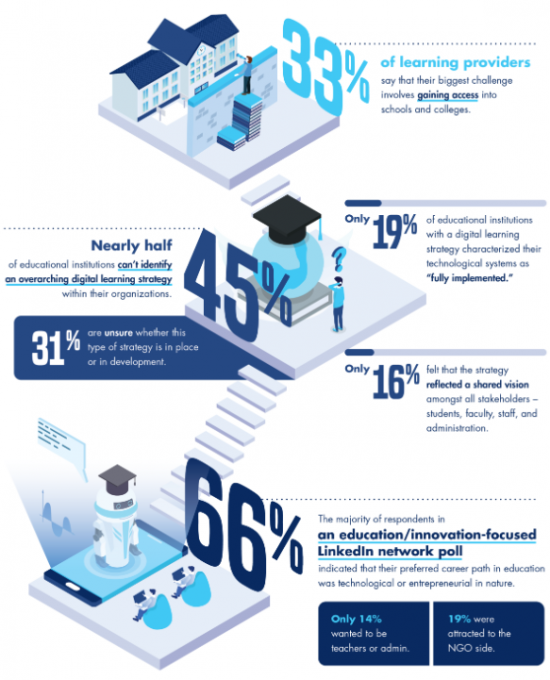
|
市場調査レポート
商品コード
1346140
EdTechの現状:ポストCOVID、ブレンデッドラーニング環境における製品と市場の適合性The State of EdTech: Product-Market Fit in a Post-COVID, Blended Learning Environment |
||||||
|
|||||||
| EdTechの現状:ポストCOVID、ブレンデッドラーニング環境における製品と市場の適合性 |
|
出版日: 2023年09月07日
発行: Policy2050 LLC
ページ情報: 英文 100 Pages
納期: 即日から翌営業日
|
- 全表示
- 概要
- 目次
当レポートでは、世界のEdTech市場について調査し、EdTechの変革の可能性、パンデミックの中でのダイナミックな軌跡、そしてここからの進化の可能なリスクと報酬について、多様でユニークな洞察を提供しています。また、市場に参入する企業についても掲載しています。
インフォグラフィックス抜粋

目次
第1章 EdTechの現状についてのイントロダクション
- このレポートの主な利点
- 対象者
- このレポートに記載されている企業
- 調査手法
- エグゼクティブサマリー
第2章 ケーススタディ:EdTechイノベーターの製品と市場の適合
- EdTechスタートアップと機関および公共部門を結び付ける
- 財政的アクセスと制度的コスト
- テクノロジーの機敏性と新しい役割の開発
- 多様な学習ニーズへの対応
- 複雑な問題解決を教え、全体的な発達を促す
- 産業上のスキルギャップにデジタルで対処する
- ポストコロナ教育
- デジタルリスクとリスク管理
第3章 分析:EdTech製品と市場の適合性に関する戦略と動向
- VCを上げてアクセラレータを加速する
- 顧客中心の製品設計
- アクセシビリティへの有意義な焦点
- 反復的な製品開発
- 代替評価の推進者としてのAI
- 混合学習モデルの採用
- スキルアップと幹部教育
- デジタル移行のペースと無停止のEdTech
- より広範な組織とエコシステムを考慮する
- パンデミックへの永続的な適応
- 充実した教育の提供
- 社会全体に奉仕する
第4章 インフォグラフィックス:EdTech製品と市場の適合性に関する定量的データ
掲載企業
- Habitat Learn Group
- Kami
- Labster
- Logitech
- PopUp School
- Saint Mark's Episcopal School
- TITANS of CNC
- Tanjo AI
- Technovation
- University College London
"The State of EdTech: Product-Market Fit in a Post-COVID, Blended Learning Environment" is approximately 28,000 words (100 pages). This report has implications for innovators, investors, educators, and learners, detailing ways to drive long-term positive change while securing more immediate product-market fit.
Infographics Excerpt:

The second annual ‘Policy2050.com EdTech’ report provides diverse and unique insights into EdTech's transformative potential, its dynamic trajectory amid the pandemic, and the possible risks and rewards of its evolution from here. The report's conclusions highlight the urgent need for holistic understanding, strategic planning, and thoughtful execution.
This report will provide answers to the following questions:
- How can EdTech providers best achieve product-market fit?
- What are popular views on blended learning environments?
- How has the pandemic impacted the reputation and viability of EdTech?
- Which areas of EdTech are being overlooked?
- What are the benefits and risks of gamification and other digital trends?
- What strategies and trends signify potential growth trajectories for EdTech?
This thematic analysis is based on interviews with top EdTech innovators.
From innovative startup founders to those influencing the future directions of established tech firms and educational institutions, lengthy Zoom interviews were designed to capture the myriad ways in which EdTech is being developed and deployed.
Featured participants included:
- Gaurav Bradoo, Head of Product and Portfolio, Logitech for Education
- Richard Boyd, Co-founder and Chairman of Ultisim, CEO of Tanjo AI
- Titan Gilroy, CEO, TITANS of CNC
- Michael Bodekaer Jensen, Founder and CEO, Labster
- Hengjie Wang, Co-founder and CEO, Kami
- Jeremy Brassington, Co-founder and CEO, Habitat Learn Group
- Suren Aloyan, Co-founder and CEO, PopUp School
- Tara Chklovski, Founder and CEO, Technovation
- Marcus Pedersen, Learning Technologist, University College London
- Dr. Spencer Taintor, Head of School, Saint Mark's Episcopal School
The report aspired to answer the central question of EdTech product-market fit both qualitatively and quantitatively, by interviewing these EdTech leaders about the trends they were observing and collecting then visualizing data that speaks to the frequent sector misalignment.
Companies Mentionned
EdTech innovators and CEOs from the following technology providers and educational institutions directly participated in this primary research:
|
|
Target Audience
- Academic institutions evaluating EdTech procurement, best practices, and options
- EdTech innovators and their investors, for market research, competitive benchmarking, and post-COVID product-market fit
- Policymakers and NGOs seeking to improve or expand education, including through workforce reskilling or upskilling programs
Table of Contents
1. Introduction to the State of EdTech
- 1.1. Key Benefits of This Report
- 1.2. Target Audience
- 1.3. Companies Mentioned in This Report
- 1.4. Methodology
- 1.5. Executive Summary
2. Case Studies: EdTech Innovators' Product-Market Fit
- 2.1. Connecting EdTech Startups with Institutions and the Public Sector
- 2.2. Financial Accessibility and Institutional Costs
- 2.3. Technological Agility and the Development of New Roles
- 2.4. Addressing Diverse Learning Needs
- 2.5. Teaching Complex Problem-Solving and Encouraging Holistic Development
- 2.6. Digitally Addressing the Industrial Skills Gap
- 2.7. Post-COVID Education
- 2.8. Digital Risks and Risk Management
3. Analysis: Strategies and Trends for EdTech Product-Market Fit
- 3.1. Raising VC and Accelerating Accelerators
- 3.2. Customer-centric Product Design
- 3.3. A Meaningful Focus on Accessibility
- 3.4. Iterative Product Development
- 3.5. AI as a Driver of Alternative Assessments
- 3.6. Adoption of Blended Learning Models
- 3.7. Upskilling and Executive Education
- 3.8. Pace of Digital Transition and Non-Disruptive EdTech
- 3.9. Accounting for the Broader Organization and Ecosystem
- 3.10. Enduring Pandemic Adaptations
- 3.11. Delivering a Well-Rounded Education
- 3.12. Serving Society at Large


